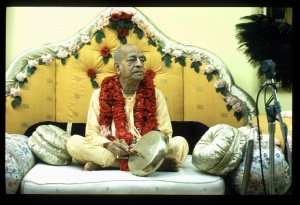CC Adi 14.30: Difference between revisions
m (1 revision(s)) |
No edit summary |
||
| Line 1: | Line 1: | ||
{{ | [[Category:Sri Caitanya-caritamrta - Adi-lila Chapter 14|C030]] | ||
<div style="float:left">'''[[Sri Caitanya-caritamrta|Śrī Caitanya-caritāmṛta]] - [[CC Adi|Ādi-līlā]] - [[CC Adi 14|Chapter 14: Lord Caitanya's Childhood Pastimes]]'''</div> | |||
<div style="float:right">[[File:Go-previous.png|link=CC Adi 14.29|Ādi-līlā 14.29]] '''[[CC Adi 14.29|Ādi-līlā 14.29]] - [[CC Adi 14.31|Ādi-līlā 14.31]]''' [[File:Go-next.png|link=CC Adi 14.31|Ādi-līlā 14.31]]</div> | |||
{{CompareVersions|CC|Adi 14.30|CC 1975|CC 1996}} | |||
{{RandomImage}} | |||
==== TEXT 30 ==== | ==== TEXT 30 ==== | ||
<div | <div class="verse"> | ||
antare vismita śacī balila tāhāre | :antare vismita śacī balila tāhāre | ||
“māṭi khāite jñāna-yoga ke śikhāla tore | :“māṭi khāite jñāna-yoga ke śikhāla tore | ||
</div> | </div> | ||
| Line 12: | Line 16: | ||
==== SYNONYMS ==== | ==== SYNONYMS ==== | ||
<div | <div class="synonyms"> | ||
''antare''—within herself; ''vismita''—surprised; ''śacī''—mother Śacī; ''balila''—replied; ''tāhāre''—unto Him; ''māṭi''—dirt; ''khāite''—to eat; ''jñāna-yoga''—philosophical speculation; ''ke''—who; ''śikhāla''—taught; ''tore''—You. | |||
</div> | </div> | ||
| Line 19: | Line 23: | ||
==== TRANSLATION ==== | ==== TRANSLATION ==== | ||
<div | <div class="translation"> | ||
Astonished that the child was speaking Māyāvāda philosophy, mother Śacī replied, “Who has taught You this philosophical speculation that justifies eating dirt?” | Astonished that the child was speaking Māyāvāda philosophy, mother Śacī replied, “Who has taught You this philosophical speculation that justifies eating dirt?” | ||
</div> | </div> | ||
| Line 26: | Line 30: | ||
==== PURPORT ==== | ==== PURPORT ==== | ||
<div | <div class="purport"> | ||
In the philosophical discourse between the mother and the son, when the son said that everything is one, as impersonalists say, the mother replied, “If everything is one, why do people in general not eat dirt but eat the food grains produced from the dirt?” | In the philosophical discourse between the mother and the son, when the son said that everything is one, as impersonalists say, the mother replied, “If everything is one, why do people in general not eat dirt but eat the food grains produced from the dirt?” | ||
</div> | </div> | ||
__NOTOC__ | |||
<div style="float:right; clear:both;">[[File:Go-previous.png|link=CC Adi 14.29|Ādi-līlā 14.29]] '''[[CC Adi 14.29|Ādi-līlā 14.29]] - [[CC Adi 14.31|Ādi-līlā 14.31]]''' [[File:Go-next.png|link=CC Adi 14.31|Ādi-līlā 14.31]]</div> | |||
__NOTOC__ | |||
__NOEDITSECTION__ | |||
Revision as of 15:57, 16 July 2021

His Divine Grace
A.C. Bhaktivedanta Swami Prabhupada
A.C. Bhaktivedanta Swami Prabhupada
TEXT 30
- antare vismita śacī balila tāhāre
- “māṭi khāite jñāna-yoga ke śikhāla tore
SYNONYMS
antare—within herself; vismita—surprised; śacī—mother Śacī; balila—replied; tāhāre—unto Him; māṭi—dirt; khāite—to eat; jñāna-yoga—philosophical speculation; ke—who; śikhāla—taught; tore—You.
TRANSLATION
Astonished that the child was speaking Māyāvāda philosophy, mother Śacī replied, “Who has taught You this philosophical speculation that justifies eating dirt?”
PURPORT
In the philosophical discourse between the mother and the son, when the son said that everything is one, as impersonalists say, the mother replied, “If everything is one, why do people in general not eat dirt but eat the food grains produced from the dirt?”